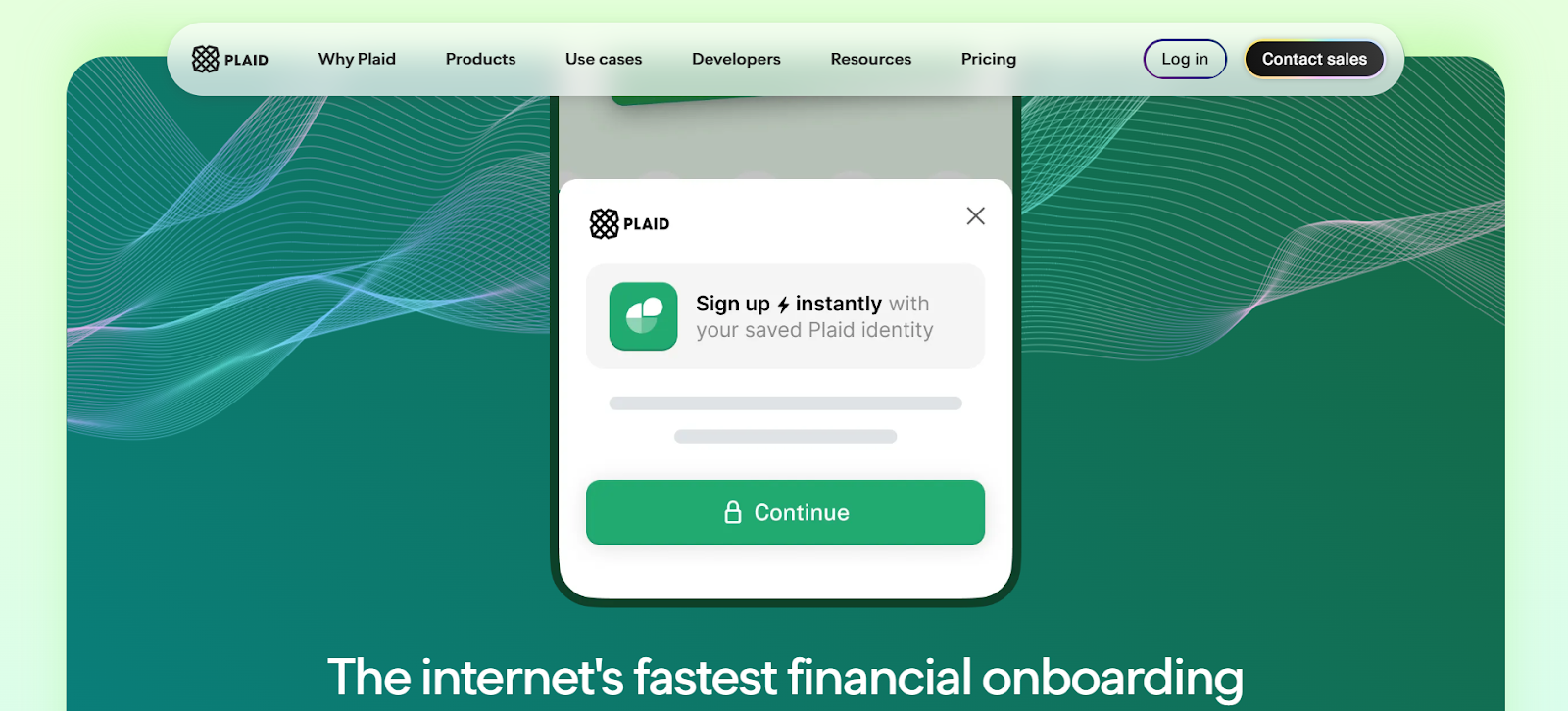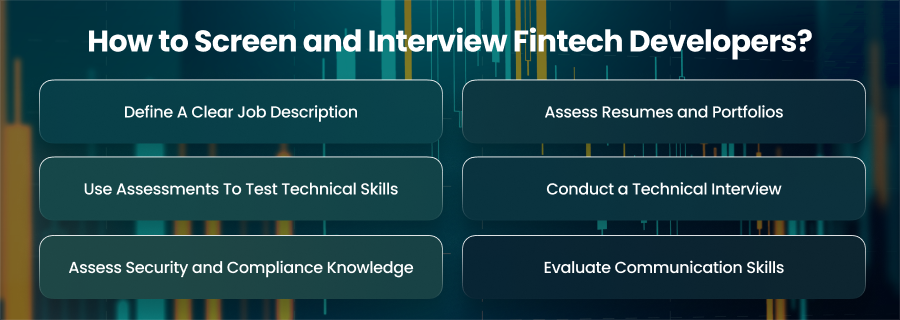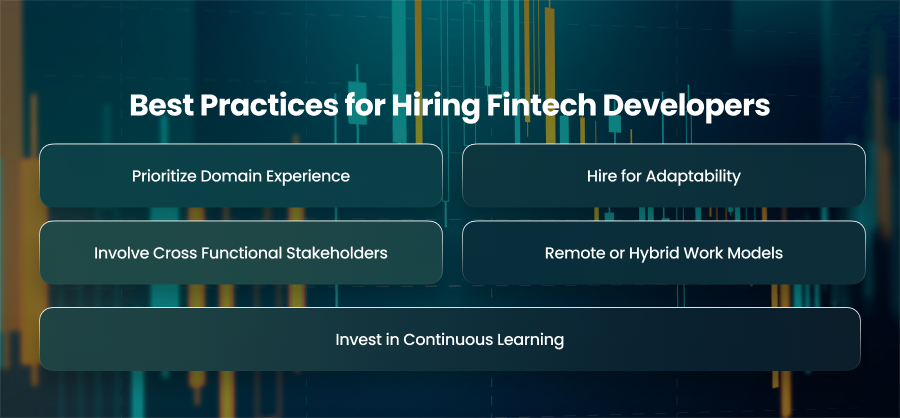According to Deloitte, the number of fintech job listings will rise by 22% by the end of this year. Additionally, 75% of financial companies are investing in blockchain and AI, which calls for specialized knowledge.
As fintech has changed the financial world with new technologies, maintaining the pace of this change requires hiring dev teams with experience in developing fintech technologies.
Moreover, unlike traditional tech startups, fintech ventures operate in a highly regulated and fast paced environment where a single code flaw or security lapse could be catastrophic.
So, in this guide, we’ll explore why you should hire dev teams for your fintech startup. Moreover, we will also discuss how to screen and interview candidates.
Why Should You Hire Dev Teams for Fintech?

Working with Fintech Regulations
Fintech requires strict and changing regulations. Moreover, compliance requirements such as Know Your Customer and Anti Money Laundering are strictly enforced. A fintech dev team understands how to build applications that inherently comply with these laws. Also, they can integrate regulatory measures like encrypted data storage and audit logs directly into your systems. Hence, with experienced fintech developers, your startup can be in a better position to avoid legal trouble and gain the trust of both regulators and customers.
Security
Security is paramount in fintech. Every transaction and API call can be a potential target for cybercriminals. Moreover, a specialized development team understands the importance of incorporating security at every layer of the technology stack. Additionally, they can implement strong encryption practices and multi factor authentication. Furthermore, they can ensure secure API integrations and real time monitoring systems to detect threats early.
Scalable and Reliable Fintech Products
The nature of fintech demands applications that can handle large volumes of traffic and transactions without crashing or slowing down. Whether it’s processing payments or issuing loans, your backend infrastructure must be reliable under pressure. Furthermore, Fintech dev teams design systems with scalability in mind from the beginning. Moreover, they use techniques such as microservices architecture and load balancing to build apps.
Integration with Third-Party APIs

In order to carry out their fundamental tasks, fintech products usually depend on other services. Payment gateways like PayPal or Stripe and banking APIs like Plaid may be connected to fintech applications. Fintech developers are adept at managing these integrations in a safe and effective manner.
Moreover, they build features like error handling and real time synchronization. Furthermore, this ensures the product functions smoothly even when external services are involved. Moreover, they understand how to evaluate the risks and limitations of each third party tool and plan accordingly.
User Experience
Users won’t interact with your platform if they have doubts about its dependability and security. Also, they won’t share their sensitive financial data. Moreover, a specialized development team understands that user experience isn’t about pretty interfaces; it’s about functionality that works flawlessly.
Moreover, they ensure fast load times and accurate transaction records. Furthermore, they ensure accurate transaction records. Hence, these small but critical details collectively build trust, which is essential for user acquisition and retention.
Speed to Market
Fintech is a competitive space where being first often means being remembered. Rushing to market without a solid base, however, might backfire. In order to ensure that you can launch quickly without accumulating technical debt that may hinder you later, a competent development team helps strike a balance between speedy development and code quality. Moreover, they can quickly prototype minimum viable products and optimize development. Hence, this allows your business to remain agile without compromising compliance or reliability.
Reducing Technical Risk
When you hire an inexperienced or misaligned development team, it can be one of the costliest mistakes for a fintech startup. Poorly written code and noncompliant architecture can lead to major rework. So, you should invest in a skilled fintech team. These groups know how to create scalable and maintainable systems that lessen the likelihood of future expensive interruptions.
Supporting Innovation
Fintech is about innovating financial services for the future. Moreover, whether you are building a decentralized finance platform or launching a digital wallet, your development team has to be more than just a technical component. Furthermore, they must be curious and able to explore emerging technologies.
Skills to Look for in Fintech Developers
Strong Foundation in Core Programming Languages
Fintech developers should be proficient in the languages that power financial applications. This includes Java and Python. They should also know how to use JavaScript and Kotlin. For instance, developers use Java for financial applications due to its strong typing and speed. Furthermore, Python is used for data analytics and algorithmic trading. Also, you can hire Kotlin developers if you want to build high performing Android applications.
Python’s extensive library and user friendliness make it a popular choice for machine learning.
Real time dashboards and frontend development also require JavaScript and TypeScript.
Experience with Secure Coding Practices
Security is non negotiable in fintech, and developers should have a solid grasp of secure coding principles. Moreover, this includes protection against common vulnerabilities like SQL injection and improper authentication flows. Moreover, a great fintech developer should also know how to use these tools, like static code analyzers, and perform code reviews.
Knowledge of Financial Protocols and Regulations
Developers working in fintech should have at least foundational knowledge of financial regulations. They should be knowledgeable about frameworks for safe payment processing and data security, but they are not expected to be legal specialists. As a result, this information enables developers to anticipate compliance requirements before they become an issue and make design choices that comply with legal standards.
API Design Skills
Fintech platforms rarely operate in isolation. Moreover, they rely on a network of third party services and financial institutions. Therefore, developers should have skills in both consuming and designing APIs. Furthermore, they should understand REST and RESTful architecture and OpenAI specifications. Additionally, they must know how to use third party APIs like Stripe. Their ability to offer secure and scalable internal APIs that support future enhancements and functional expansions is equally important.
Cloud and DevOps Expertise
Modern banking apps commonly leverage cloud platforms, which offer performance at lower operational costs. Developers should also know how to design cloud apps using containerization. They must also be familiar with DevOps technologies to ensure automated testing and smooth deployments.
Databases
Fintech apps depend on real time data accuracy and high volume transaction handling. Also, developers should be comfortable with SQL and NoSQL databases. Furthermore, they should have experience with event driven architecture and real time data streaming technologies. These tools help maintain system responsiveness and data consistency even during traffic spikes or financial reporting cycles.
Frontend Development Skills
User experience plays a critical role in fintech. So, developers working on the frontend must be proficient in JavaScript frameworks like React. Moreover, they should understand how to design clean and intuitive interfaces that communicate trust and clarity. This includes building responsive layouts and implementing input validation. Also, they should be able to handle asynchronous data updates. Hence, you can hire React developers for intuitive and dynamic frontends.
Knowledge in Financial Services
One of the most valuable skills for fintech developers is knowledge of financial services. Developers with experience in banking and lending bring insight that goes beyond code. Moreover, they understand how financial products work. Furthermore, they should also know what users expect and where risks typically arise.
How to Screen and Interview Fintech Developers?

Define A Clear Job Description
First, you should draft a clear and concise job description. You should avoid generic developer listings. Instead, you should highlight the specific technologies and compliance knowledge required for your fintech product. Also, you should be clear whether you’re building a payment gateway or a crypto wallet because each has its own technical and regulatory challenges. Moreover, you should outline the responsibilities of developers.
Assess Resumes and Portfolios
Examining the resumes and portfolios of the applicants is the next stage. To assess their abilities, you may also go through their GitHub accounts and any personal websites. You should look for projects or previous roles that demonstrate fintech experience, which could include banking apps and payment processing systems. Also, you should pay attention to contributions that indicate experience with handling sensitive data and API integrations.
Use Assessments To Test Technical Skills
You can further asses a candidate’s technical skills to through a coding test. You can design tests that mimic real world problems. Moreover, your assignment can include tasks on secure data handling. Also, you can ask them about API integration and error handling. Furthermore, you can include tasks on data modeling for transaction history or user accounts.
Conduct a Technical Interview
After the candidates pass the initial tests, you should then conduct technical interviews. You can ask them about real world scenarios they might encounter on the job. Furthermore, you can ask them how they would build a scalable payment processing system or ensure data consistency during system failures. Moreover, you should not only evaluate their coding knowledge but also how they weigh trade offs between scalability and security.
Assess Security and Compliance Knowledge
You should also ask candidates how they would protect user data and comply with data privacy laws. Also, you can quiz them on their familiarity with standards like GDPR. While they don’t need to be compliance officers, their answer should reflect a strong understanding of why secure practices matter and how they translate into technical decisions.
Evaluate Communication Skills
Developers have to collaborate with designers and compliance teams. So, you should pay attention to how clearly a candidate communicates their ideas. You should look at how well they can explain complex technical decisions to stakeholders.
Best Practices for Hiring Fintech Developers

Prioritize Domain Experience
In the fintech world, industry experience often outweighs coding talent. While a brilliant developer can write excellent code, a fintech developer must also be aware of compliance regulations and financial system intricacies. So, you should prioritize candidates who have built or contributed to financial applications. Developers who have worked on KYC or AML implementations and data encryption workflows bring real world insights that can save your startup time and money.
Hire for Adaptability
Startups operate in a quickly changing environment, and fintech startups are no exception. This is because features pivot and regulations change. So, you should hire developers who are adaptable and comfortable with change. Moreover, candidates who have experience in fast paced environments can quickly pivot when requirements shift.
Involve Cross Functional Stakeholders
You should involve stakeholders from other departments during the hiring process to assess how well candidates align with the team’s expectations and communication styles. Moreover, this cross functional feedback can also help you evaluate soft skills and adaptability to your startup’s workflows.
Remote or Hybrid Work Models
Many talented fintech developers prefer a remote or hybrid work arrangement, especially post pandemic. So, if your startup allows it, you can expand your talent search globally to tap into specialized skill sets across borders. A remote friendly policy also helps you scale more cost effectively and access niche fintech talent.
Invest in Continuous Learning
Fintech is constantly changing with new technologies and regulations appearing regularly. So, you should encourage developers to up skill themselves by offering subscriptions to cybersecurity and fintech news platforms. Moreover, developers who are encouraged to stay updated on the latest developments in finance and technology will bring greater value to your product and help future-proof your startup.
Final Words
So, when you decide to hire dev teams for your fintech startups, it requires more than just a technical evaluation. Moreover, it demands a focus on security and domain expertise. You should follow structured hiring practices to hire the best developers. Hence, this can help you build a reliable and future-ready fintech startup.




